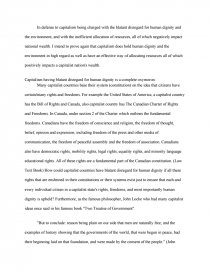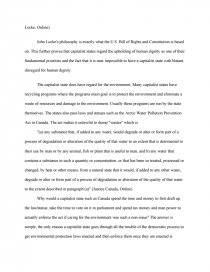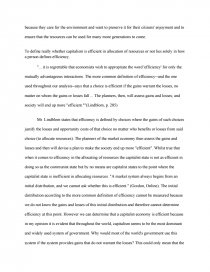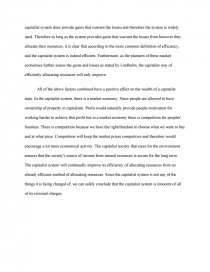Capitalism On Trial
Essay by 24 • March 7, 2011 • 1,236 Words (5 Pages) • 1,015 Views
In defense to capitalism being charged with the blatant disregard for human dignity and the environment, and with the inefficient allocation of resources, all of which negatively impact national wealth. I intend to prove again that capitalism does hold human dignity and the environment in high regard as well as have an effective way of allocating resources all of which positively impacts a capitalist nation's wealth.
Capitalism having blatant disregard for human dignity is a complete oxymoron.
Many capitalist countries base their system (constitution) on the idea that citizens have certain/many rights and freedoms. For example the United States of America, a capitalist country has the Bill of Rights and Canada, also capitalist country has The Canadian Charter of Rights and Freedoms. In Canada, under section 2 of the Charter which outlines the fundamental freedoms. Canadians have the freedom of conscience and religion, the freedom of thought, belief, opinion and expression, including freedom of the press and other media of communication, the freedom of peaceful assembly and the freedom of association. Canadians also have democratic rights, mobility rights, legal rights, equality rights, and minority language educational rights. All of these rights are a fundamental part of the Canadian constitution. (Law Text Book) How could capitalist countries have blatant disregard for human dignity if all these rights that are enshrined in their constitutions or their systems exist just to ensure that each and every individual citizen in a capitalist state's rights, freedoms, and most importantly human dignity is upheld? Furthermore, as the famous philosopher, John Locke who had many capitalist ideas once said in his famous book "Two Treatise of Government".
"But to conclude: reason being plain on our side that men are naturally free; and the examples of history showing that the governments of the world, that were begun in peace, had their beginning laid on that foundation, and were made by the consent of the people." (John Locke, Online)
John Locke's philosophy is exactly what the U.S. Bill of Rights and Constitution is based on. This further proves that capitalist states regard the upholding of human dignity as one of their fundamental priorities and the fact that it is near impossible to have a capitalist state with blatant disregard for human dignity.
The capitalist state does have regard for the environment. Many capitalist states have recycling programs where the programs main goal is to protect the environment and eliminate a waste of resources and damage to the environment. Usually these programs are run by the state themselves. The states also pass laws and statues such as the Arctic Water Pollution Prevention Act in Canada. The act makes it unlawful to dump "wastes" which is
"(a) any substance that, if added to any water, would degrade or alter or form part of a process of degradation or alteration of the quality of that water to an extent that is detrimental to their use by man or by any animal, fish or plant that is useful to man, and b) any water that contains a substance in such a quantity or concentration, or that has been so treated, processed or changed, by heat or other means, from a natural state that it would, if added to any other water, degrade or alter or form part of a process of degradation or alteration of the quality of that water to the extent described in paragraph (a)" (Justice Canada, Online)
Why would a capitalist state such as Canada spend the time and money to first draft up the law/statue, take the time to vote on it in parliament and spend tax money and man power to actually enforce the act if caring for the environment was such a non-issue? The answer is simple, the only reason a capitalist state goes through all the trouble of the democratic process to get environmental protection laws enacted and then enforce them once they are enacted is because they care for the environment and want to preserve it for their citizens' enjoyment and to ensure that the resources can be used for many more generations to come.
To define really whether capitalism is efficient in allocation of resources or not lies solely in how a person defines efficiency.
"... it is regrettable that economists wish to appropriate the word 'efficiency' for only the mutually advantageous interactions. The more common definition of efficiency--and the one used throughout our analysis--says that a choice is efficient if the gains warrant the losses,
...
...



